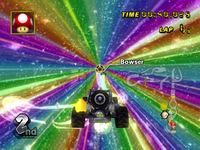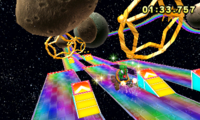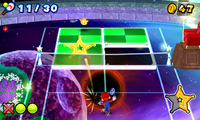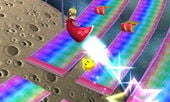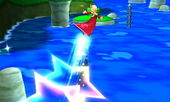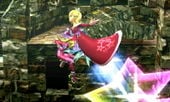Launch Star: Difference between revisions
Mamaweegee (talk | contribs) |
Mamaweegee (talk | contribs) |
||
| Line 82: | Line 82: | ||
|JapR=Sutāringu | |JapR=Sutāringu | ||
|JapM=Star Ring | |JapM=Star Ring | ||
|Spa=Anillo estelar (SMG/SMG2)<br>Salto estelar (SSB3DS/WiiU) | |Spa=Anillo estelar (''SMG/SMG2'')<br>Salto estelar (''SSB3DS/WiiU'') | ||
|SpaM=Star ring<br>Stellar jump | |SpaM=Star ring<br>Stellar jump | ||
|Dut=Lanceerster | |Dut=Lanceerster | ||
Revision as of 09:57, August 24, 2016
Template:Item-infobox Template:LLQuote
A Launch Star is a major item in both Super Mario Galaxy and Super Mario Galaxy 2. Launch Stars are large (usually orange) stars that hover just above the ground of a planet, though occasionally they can also appear floating in the air above a planet, or just floating in space.
History
Super Mario series
Super Mario Galaxy
In Super Mario Galaxy, the first time Mario uses a Launch Star, the path of the Launch Star will originally be invisible, but will be traced out in space as Mario is flying to the next planet. However, if Mario later returns to a Launch Star that he has already used to travel to another planet, the path will be visible before he uses it.
They can only be activated by shaking the Wii Remote and causing Mario to spin when he is either in or next to a Launch Star, though any Launch Stars in the level will visibly spin when the Wii Remote is shaken, regardless of whether or not he is necessarily close to one. When activated, a Launch Star will catapult Mario to another planet or planets. When Mario stands directly under a Launch Star, the gravity of the Launch Star will pull Mario into the center of it automatically. If the player does not shake the Wii Remote after a few seconds, the Launch Star will release Mario and he will touch down on the ground again.
Launch Stars are not always readily available for Mario to use. In some cases, Mario must complete a certain task or objective before the Launch Star will appear, such as collecting five yellow Star Chips, eliminating all the enemies on a particular planet, or freeing a yellow Luma or the Launch Star itself from an Crystal or a cage. In addition, yellow Lumas are also able to transform into Launch Stars independently, though this is more common in Super Mario Galaxy 2 (the player will usually have to free the Luma from a cage before they will transform into a Launch Star, though this is not always the case). It is revealed in this game that these Lumas still retain the ability to talk to Mario while in Launch Star form.
Launch Stars often let Mario fly through space for a short time before landing on another planet, unlike their smaller related items, Sling Stars, which often fling Mario directly to another planet, with very little space in between. While flying through space, Mario will occasionally hit a floating Star Crystal that has been placed directly in the path of the Launch Star, which will often release multiple Star Bits that will float around Mario until he lands on the planet. Mario can collect these Star Bits by touching them with the Star Cursor.
After Mario feeds a Hungry Luma, it will transform into a new planet or galaxy and leave behind a pink Launch Star leading to that planet. The only Hungry Luma that will not leave behind a Launch Star after being fed is the one that transforms into the Hurry-Scurry Planet in the Sea Slide Galaxy (Mario must use a cannon to reach the planet instead).
There is also a green Launch Star located onboard the Comet Observatory that will take Mario to the Planet of Trials when activated. This one, as well as the Launch Stars on the Planet of Trials, are the only green Launch Stars in the entire game.
Though usually immovable, a Launch Star always stays (or appears after collecting 5 Star Chips) on its permanent location. However, one Launch Star can actually be moved upwards and downwards with regardless where it sends the player to. In the mission "Sunbaked Sand Castle" in Dusty Dune Galaxy, the player must go to the second planet and collect 5 Star Chips to make the Launch Star appear on top of the tower. Since the player can make the tower rise or sink by pressing a Ground-Pound Switch, the Launch Star can also rise or sink along with the tower, but it does not sink in the sand.
Super Mario Galaxy 2
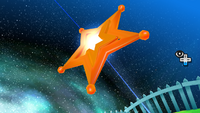
Launch Stars reappear in Super Mario Galaxy 2, and serve the same function as in Super Mario Galaxy. In this game, the path of each Launch Star that Mario uses appears before he uses it for the first time, as well as each time he uses it following the first time. One exception to this is in the Grandmaster Galaxy, where no path is projected.
Mario Kart series
Mario Kart Wii
In Mario Kart Wii, a single large Launch Star appears in Rainbow Road, where it acts as a cannon and shoots racers into a rainbow tunnel and through another large Launch Star at the end (the second Launch Star does not launch racers). The design of the railings of this course also has multiple Launch Stars on it.
Mario Kart 7
Launch Stars also appear on the Rainbow Road course in Mario Kart 7, with the look they have in Mario Kart Wii. Several of them appear in the last section of the course. If racers are able to use the glider, they can fly into these Launch Stars to get a speed boost and continue gliding through the next ones. If the player touches one when they're not gliding, they can still get a small speed boost.
Mario Kart 8
Launch Stars appear again in Mario Kart 8 with a different appearance.
In N64 Rainbow Road, they appear as boost panels and in the air where racers can glide through them to get a speed boost. They are white with a slight color changing hue and a gold frame encompasses them. On the race track, the rails are designed of Launch Stars, instead of, in the original appearance, regular forms of stars. They have an unique sound when driven through.
Mario Tennis Open
Launch Stars make an appearance in the Special Minigame Galaxy Rally in Mario Tennis Open. When the player completes the meter by collecting Star Chips, then the Launch Star is completed. For every consecutive hit by the ball, the Launch Star gives the player five more coins. The Launch Star's meter depletes after a certain amount of time. Once the meter reaches zero, the Launch Star disappears, and Star Chips reappear.
Super Smash Bros. for Nintendo 3DS / Wii U
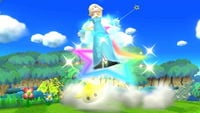
Launch Star is Rosalina's up special move in Super Smash Bros. for Nintendo 3DS / Wii U. When Rosalina uses this move, a Launch Star appears and sends Rosalina into the air at an arc, similar to their effects in Super Mario Galaxy and Super Mario Galaxy 2. The angle she travels at can be adjusted by tilting the Control Stick or Circle Pad, though the move itself deals no damage. The Launch Star itself is multicolored instead of one single color, and the small orbs at the end of its points have been removed.
Like with other characters' special moves, two custom variants for this move exist:
Launch Star Plus fires Rosalina at a much faster rate, but the player can't control its angle, which offers more vertical distance than horizontal.
Launch Star Attack sacrifices travel distance to allow Rosalina to damage opponents with her body, and ends with a move that's similar to her neutral aerial attack. However, the move does halt her momentum upon ending, and it can't travel straight up.
Gallery
- Rosalina-LaunchStar-SSBU.jpg
Launch Star
- Rosalina-LaunchStarPlus-SSBU.jpg
Launch Star Plus
- Rosalina-LaunchStarAttack-SSBU.jpg
Launch Star Attack.
Names in other languages
Trivia
- The green Launch Star located on the Comet Observatory in Super Mario Galaxy is the only Launch Star between the two games that is actually inaccessible the first time it is encountered. It can only be restored after Mario has collected all three Green Power Stars hidden throughout the game.
- When a Launch Star spins, it will not rotate perfectly on its axis, but will rather appear to wobble back and forth slightly while spinning around.
| Mario Tennis Open | ||
|---|---|---|
| Playable characters | Default | Mario • Luigi • Princess Peach • Yoshi • Princess Daisy • Boo • Bowser Jr. • Diddy Kong • Donkey Kong • Waluigi • Wario • Bowser |
| Unlockable | Luma • Baby Mario • Baby Peach • Dry Bowser | |
| Obtained from QR code | Red Yoshi • Blue Yoshi • Light Blue Yoshi • Yellow Yoshi • Pink Yoshi • Black Yoshi • White Yoshi • Metal Mario | |
| Non-playable characters | Toad • Lakitu • Toads • Goomba • Mechakoopa • Penguin • Shy Guy • Koopa Troopa • Piranha Plant • Inky Piranha Plant • Buzzy Beetle • Koopa Paratroopa | |
| Courts | Mario Stadium • Mushroom Valley • Wario Dunes • DK Jungle • Bowser's Castle • Penguin Iceberg • Peach's Palace • Galaxy Arena | |
| Cups | Mushroom Cup • Flower Cup • Banana Cup • Champions Cup • 1-Up Mushroom Cup • Ice Flower Cup • Shell Cup • Final Cup | |
| Special Games | Ring Shot • Super Mario Tennis • Galaxy Rally • Ink Showdown | |

